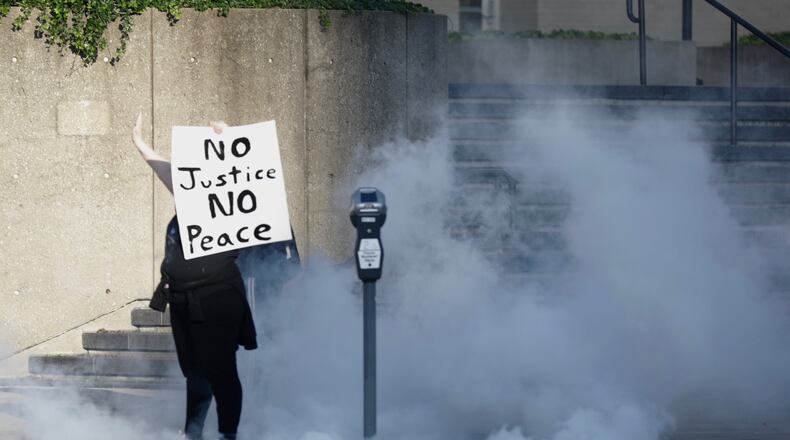SHARE YOUR THOUGHTS: ‘Courageous Conversation’ on black community, police relations in Dayton set
The governor called on experts to develop clear guidelines on when police should use non-lethal force against demonstrators, such as tear gas, pepper spray or projectiles.
He said he will use existing state resources to focus on recruiting more women and minorities into law enforcement and reach out to some 400 police departments that opted not to pursue best practices on use of force and other policies that state leaders established five years ago.
“We intend to work with them and find out why they’re not complying,” DeWine said.
RELATED: While protests continue, lawmakers consider ‘stand your ground’ gun bill
Ohio House Democrats also rolled out a package of police reform bills that seek to demilitarize police, prohibit racial profiling, ban the use of arrest or ticket quotas, mandate training in deescalation, prohibit the use of tear gas and require independent investigations of all officer-involved shootings. The package also seeks to create central databases for use of force reports and officer employment histories.
DeWine said he agrees more transparency is needed so hiring departments know an officer’s history and there should be consistency in reports on use of force.
Dayton Mayor Nan Whaley laid out a five point police reform plan that includes increasing officer training on implicit bias and deescalation techniques; reviewing use of force reports to try to identify bias; and improving transparency of the process for filing police misconduct reports.
The Dayton Unit NAACP released an eight-point plan to reform the criminal justice system and improve police relations with the black community. That plan includes implementing a citizens' review board, adding transparency to police discipline, expanding use of body cams and dash cameras, improving training, and banning knee holds and choke holds.
DeWine said he is open to ideas and will work with a variety of groups to accomplish reforms.
Ohio has 868 law enforcement agencies that employ 32,000 sworn officers.
Following the police shooting death of 22-year-old John Crawford III at a Walmart in Beavercreek in 2014, DeWine, then attorney general, and then Gov. John Kasich appointed task forces to look at police training and standards, as well as police-community relations. Each group made recommendations.
Kasich’s group, now named the Ohio Collaborative Community-Police Advisory Board, reported in March that 68% of Ohio’s law enforcement agencies have been certified in standards such as use of force, use of deadly force and a policy prohibiting racial profiling.
RELATED: What’s happened to policing in Ohio since John Crawford III’s death?
DeWine’s group recommended upgrading criteria for becoming a police officer to include a high school diploma or GED and ability to pass a fitness test and drug screen.
It also recommended that current officers receive at least 40 hours a year in professional training to cover implicit bias, deescalation techniques, recognizing mental health challenges and the constitutional use of force.
RELATED: Dayton mayor vows police changes; some black leaders skeptical
Required annual training hours increased to 20 but the mandate was dropped once state funding dried up.
About the Author


